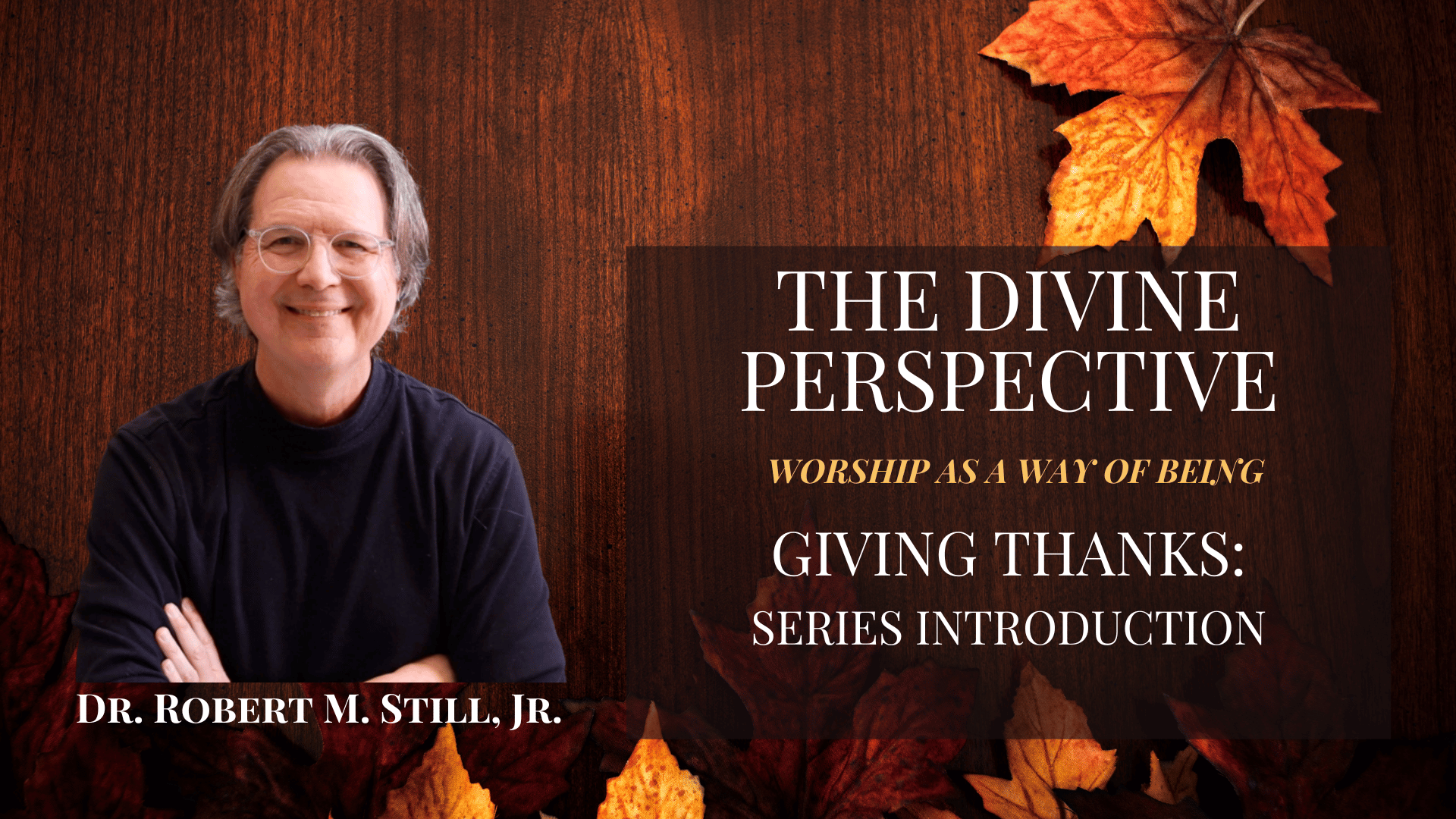Giving Thanks: Series Introduction

Giving Thanks [Series]: Introduction
Giving thanks and practicing the attitude of gratitude is always appropriate. It is particularly healthy and helpful during the days leading up to the Thanksgiving Holidays to reflect upon all that is worthy of one’s appreciation.
Worship is Good For You
Giving thanks is one of the essential actions and attitudes of Christian worship. Thankfulness is foundational to worship that is in spirit and truth (John 4:24).
Furthermore, more than sufficient scientific, psychological, and theological research supports the hypothesis that worship is good for you physically, emotionally, and spiritually.
Spirituality and gratitude are associated with physical well-being and healing. A 2015 American Psychological Association study of heart failure patients reported that gratitude and spiritual well-being are related to better mood and sleep, less fatigue, and more self-sufficiency and that “gratitude may be a treatment for improving well-being in heart failure patients’ lives." [1]
Psychologically, developing a habitual gratitude practice is often a normative therapy component for improving a host of emotional dysfunctions. Giving thanks helps bring healing to our wounded souls. A 2022 University of Connecticut study reported that Gratitude to God can promote physical and psychological wellbeing.[2]
Public worship participation can also lead to improvement in one’s physical health. A research study published by The Public Library of Science (PLOS) found that consistent worshipers (“churchgoers”) had a 55% reduction of all-cause mortality risk when compared with non-churchgoers, showing better values for metabolic, cardiovascular, and nutritional/inflammatory clinical/biologic markers. [3] Researchers at Vanderbilt University concluded that “Increased religiosity–as determined by attendance at worship services–is associated with less stress and enhanced longevity.”[4]
These studies provide supporting evidence for the foundational claim that worship is good for you.
A Thankless Generation ?
In the 21st century, modern humanity has turned the idea of offering thanksgiving to an almighty, benevolent God on its head. Indeed, many people feel entitled to social and economic benefits as their birthright. Their mentality is “The world owes me.” Individuals with this mindset display an attitude of ingratitude.
The social phenomenon of entitlement mentality has been evolving since the Enlightenment era when philosophers like Adam Smith (The Theory of Moral Sentiments, 1759) reduced the ideals of gratitude to self-interest and consumeristic exchange. “What gives pleasure or pain,’ Smith writes, ‘is the sole exciting cause of gratitude and resentment.” [5]
What Is Worthy of Gratitude?
In Being Grateful and Feeling Grateful: Reconsidering the Phenomenology of Gratitude to God, Kent Dunnington deeply explores the distinctions between what he identifies as ‘trivial’ and ‘deep’ gratitude. [6] He differentiates between “gratitude-appropriate situations” and those instances that “naturally provoke the emotion of gratitude.” Dunnington writes that a fairly representative summation of the philosophical literature would indicate gratitude is appropriate when:
1. A benefactor gives a benefit to a beneficiary.
2. The benefit is something good, something the beneficiary cares to have.
3. The benefactor has acted benevolently in providing the benefit; the benefactor didn’t accidentally give the benefit, nor was the benefit provided out of sheer duty.
4. The benefactor acted at some personal cost.
As I examined these criteria, I felt convicted of practicing gratitude shallowly. Perhaps you’ve heard the advice, ‘Write down three things you are thankful for daily.’ After reading Dunnington, I realized I often filled my list with trivial things. While that might be better than nothing (or worse, ingratitude), I want to explore more profound Biblical aspects of gratitude in this time and space.
What Are You Thankful For?
For our purposes, what do you have to be thankful for?
Does not the Bible present a rationale for expressing appreciation for those treasures that are far deeper than temporal benefits? Can we find in scripture profound blessings for which to be thankful? Of course, we can.
In Part 2 of this series, I want to share a bundle of profound blessings found in 1 Timothy 1:12-17.
1. Mills, P. J., Redwine, L., Chopra, D., et al. (2015). The role of gratitude in spiritual well-being in asymptomatic heart failure patients. Spirituality in Clinical Practice, 2(1), 5–17. https://doi.org/10.1037/scp0000050
2. Park, Crystal L., Joshua A. Wilt, and Adam B. David. 2022. Gratitude to God: A Unique Construct Adding to Our Understanding of Religiousness and Gratitude. Religions 13: 872. https://doi.org/10.3390/rel13090872
3. Bruce MA, Martins D, Duru K, Beech BM, Sims M, Harawa N, et al. (2017) Church attendance, allostatic load and mortality in middle aged adults. PLoS ONE 12(5): e0177618. https://doi.org/10.1371/journal.pone.0177618
4. https://news.vanderbilt.edu/2017/05/31/worship-is-good-for-your-health
5. Smith, Adam. (2021). The Theory of Moral Sentiments. Penguin Classics. as cited in Kent Dunnington (2023) Being Grateful and Feeling Grateful: Reconsidering the Phenomenology of Gratitude to God, The Journal of Positive Psychology, DOI: 10.1080/17439760.2023.2179937
6. Dunnington, 5.
